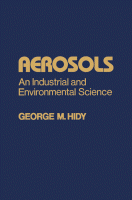Browse content
Table of contents
Actions for selected chapters
- Full text access
- Book chapterNo access
CHAPTER 1 - INTRODUCTION
Pages 1-16 - Book chapterNo access
CHAPTER 2 - THE DYNAMICS OF SMALL PARTICLES
Pages 17-56 - Book chapterNo access
CHAPTER 3 - PARTICLE CLOUDS—THE SIZE DISTRIBUTION FUNCTION
Pages 57-97 - Book chapterNo access
CHAPTER 4 - GENERATION OF PARTICULATE CLOUDS
Pages 98-162 - Book chapterNo access
CHAPTER 5 - MEASUREMENT OF AEROSOL PROPERTIES
Pages 163-253 - Book chapterNo access
CHAPTER 6 - APPLICATIONS TO TECHNOLOGY
Pages 254-353 - Book chapterNo access
CHAPTER 7 - ATMOSPHERIC AEROSOLS
Pages 354-476 - Book chapterNo access
CHAPTER 8 - EFFECTS ON THE EARTH'S ATMOSPHERE
Pages 477-577 - Book chapterNo access
CHAPTER 9 - HEALTH EFFECTS OF INHALED AEROSOLS
Pages 578-644 - Book chapterNo access
CHAPTER 10 - REGULATION AND CONTROL OF AEROSOLS
Pages 645-745 - Book chapterNo access
APPENDIX - PARTICLE SIZE DISTRIBUTIONS
Pages 746-755 - Book chapterNo access
INDEX
Pages 757-774
About the book
Description
Aerosols: An Industrial and Environmental Science is a comprehensive account of the science and technology of aerosols as well as their aerodynamic and physico-chemical properties. Measurement techniques and results are presented in terms of a framework of classical mechanics and macroscopic chemistry. This book is comprised of 10 chapters and begins with a discussion on the foundations of modern aerosol science and technology, followed by a review of the dynamic theory of aerosols as rigid spheres. The production of particle suspensions, the methods of particle sampling and measurement, and physical or chemical characterization are then considered, along with particle diffusion by Brownian motion, particle formation and growth, and coagulation processes. The formation of particle clouds is described by means of molecular agglomeration (condensation) processes, breakup and disintegration, and chemical reactions. The remaining chapters focus on several major applications of aerosol science in areas such as combustion, agriculture, and medicine. This monograph is intended to serve scientists and engineers who are concerned with the underlying principles of aerodynamic and physical chemical behavior of aerosols, and could also be used as a text for graduate students in specialized courses on aerosol or colloid chemistry, atmospheric processes, and chemical, mechanical, or environmental engineering.
Aerosols: An Industrial and Environmental Science is a comprehensive account of the science and technology of aerosols as well as their aerodynamic and physico-chemical properties. Measurement techniques and results are presented in terms of a framework of classical mechanics and macroscopic chemistry. This book is comprised of 10 chapters and begins with a discussion on the foundations of modern aerosol science and technology, followed by a review of the dynamic theory of aerosols as rigid spheres. The production of particle suspensions, the methods of particle sampling and measurement, and physical or chemical characterization are then considered, along with particle diffusion by Brownian motion, particle formation and growth, and coagulation processes. The formation of particle clouds is described by means of molecular agglomeration (condensation) processes, breakup and disintegration, and chemical reactions. The remaining chapters focus on several major applications of aerosol science in areas such as combustion, agriculture, and medicine. This monograph is intended to serve scientists and engineers who are concerned with the underlying principles of aerodynamic and physical chemical behavior of aerosols, and could also be used as a text for graduate students in specialized courses on aerosol or colloid chemistry, atmospheric processes, and chemical, mechanical, or environmental engineering.
Details
ISBN
978-0-12-347260-1
Language
English
Published
1984
Copyright
Copyright © 1984 Elsevier Inc. All rights reserved.
Imprint
Academic Press
